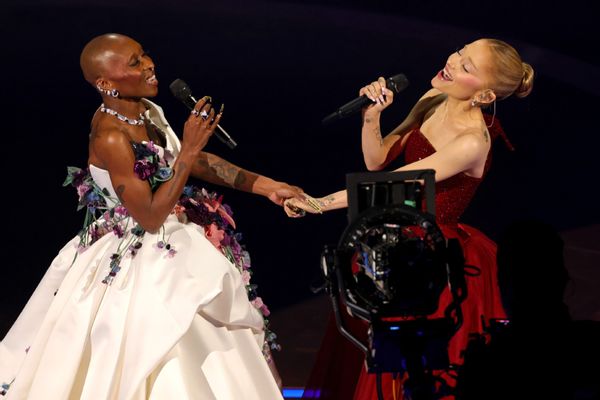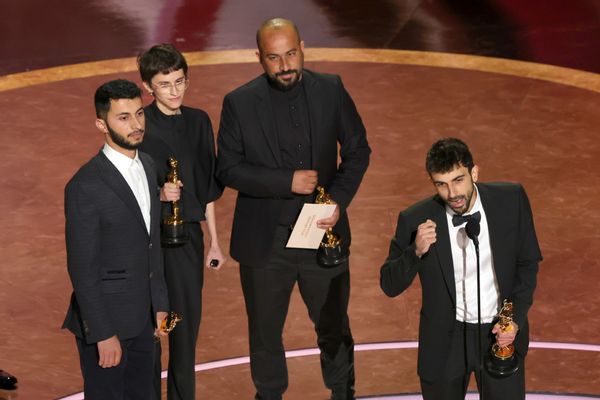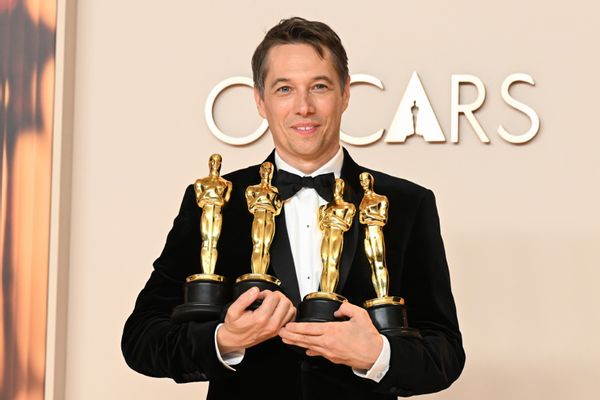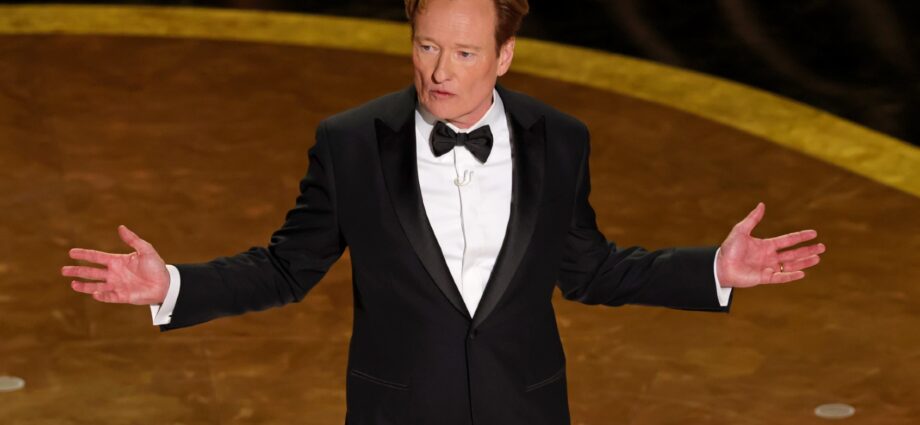COMMENTARY
Host Conan O’Brien did an admirable job keeping the crowd entertained, but he wasn’t the reason they came alive
Published March 3, 2025 10:00AM (EST)
Host Conan O’Brien speaks onstage during the 97th Annual Oscars at Dolby Theatre on March 02, 2025, in Hollywood, California. (Kevin Winter/Getty Images)
For all the hype and confusion surrounding the 97th Academy Awards, the actual ceremony was ultimately rather timid. The weeks leading up to Sunday’s show saw Hollywood’s Biggest Night shaping up to be Hollywood’s Biggest Mess, after a string of controversies big and small tarnished some of the ceremony’s glitzy sheen. Two best actress nominees were embroiled in racist scandals, a best picture frontrunner was shuffled around pundit scorecards after some use of technical AI, and the conversation around intimacy coordinators became far more complicated than it ever needed to be. And that’s not even mentioning the wildfires that ravaged Los Angeles for weeks at the beginning of 2025, making the Oscars seem like an inauspicious and even tone-deaf tradition persisting in the face of tragedy.
The Oscars ceremony was far less surprising than the nominated films, creating a dissonance between forward-thinking filmmaking and an honorary institution stuck in a holding pattern.
But the show gently yet cleverly pushed back against any detractors, opening with “Wicked” stars Cynthia Erivo and Ariana Grande singing a medley of three songs from the “Wizard of Oz” musical universe about persevering. After a brief montage of clips from Los Angeles-set films, Grande serenaded audiences with “Somewhere Over the Rainbow” before handing the spotlight to Erivo, who performed a beautiful rendition of “Home” from “The Wiz.” For their final song, Grande joined Erivo for “Defying Gravity,” recreating one of the biggest blockbuster sequences in any film from 2024. That malleable song — which has taken on its own life to mean many different things to many different people — was the perfect choice to open a show that, by and large, avoided any clear-cut statements about America’s political climate or roiling tensions worldwide. Instead, the Oscars kept things tame, using its opening medley to push for unity and celebrate the tenacity of the Los Angeles people and the city’s most famous industry.
But if humble tenacity was the show’s main message, it was also the telecast’s most prominent theme. Much of the 2025 Oscars felt like the show was just trying to make it across the finish line without any more sudden aspersions or disasters. In a year where renegade films like “The Substance,” “No Other Land,” “The Seed of the Sacred Fig,” “Nickel Boys” and “The Brutalist” were nominated for the industry’s biggest awards, the Oscars chose to play it safe, letting the winners do the difficult work in their speeches. While avoiding politics almost entirely allowed the Oscars to stay out of trouble, it also caused the show to be humdrum and bland. And though there were some admirable attempts to switch up the ceremony’s structure and a couple of bits of levity, the 97th Academy Awards were far less surprising than the nominated films, creating a dissonance between forward-thinking filmmaking and an honorary institution stuck in a holding pattern.
 (L-R) Cynthia Erivo and Ariana Grande perform onstage during the 97th Annual Oscars at Dolby Theatre on March 02, 2025, in Hollywood, California. (Kevin Winter/Getty Images)The evening’s host, Conan O’Brien, seemed just as uncertain. O’Brien delivered monologue jokes with his typical confident expertise, but the routine would’ve been better suited for a late-night talk show than the Oscars. That’s not to say that O’Brien’s jokes weren’t funny, only that they were predictable in their content and delivery style. O’Brien took affectionate jabs at the nominees without trying to land any sucker punches. His best bit was a roundabout gag that sent up “Emilia Pérez” star Karla Sofìa Gascón, whose firestorm of vehemently racist tweets uncovered in the weeks before the ceremony undoubtedly jeopardized her chances of winning.
(L-R) Cynthia Erivo and Ariana Grande perform onstage during the 97th Annual Oscars at Dolby Theatre on March 02, 2025, in Hollywood, California. (Kevin Winter/Getty Images)The evening’s host, Conan O’Brien, seemed just as uncertain. O’Brien delivered monologue jokes with his typical confident expertise, but the routine would’ve been better suited for a late-night talk show than the Oscars. That’s not to say that O’Brien’s jokes weren’t funny, only that they were predictable in their content and delivery style. O’Brien took affectionate jabs at the nominees without trying to land any sucker punches. His best bit was a roundabout gag that sent up “Emilia Pérez” star Karla Sofìa Gascón, whose firestorm of vehemently racist tweets uncovered in the weeks before the ceremony undoubtedly jeopardized her chances of winning.
“‘Anora’ uses the F-word 479 times,” O’Brien began, pausing for effect. “That’s more than the record set by Karla Sofìa Gascón’s publicist.” Cameras cut to Gascón who smiled and folded her hands to bow toward the camera in recognition before O’Brien added, “If you’re going to tweet about tonight’s show, remember: My name is Jimmy Kimmel.” This was the most controversial the show — at least as planned by its producers — ever became. O’Brien even lobbed a few lowball jokes about AI and Amazon into the crowd, but nothing that left the audience doubled over in laughter. The gags were mild and inoffensive, the perfect way to portend the remainder of the show, which felt the same way.
Want a daily wrap-up of all the news and commentary Salon has to offer? Subscribe to our morning newsletter, Crash Course.
But an interesting moment occurred toward the end of O’Brien’s monologue when the comedian stopped and told the audience he was getting serious for a moment. “The people of Los Angeles have been through a devastating ordeal,” he said. “But I want us all to remember why we gathered here tonight. … the Oscars shines a light on an incredible community of people you’ll never see: craftspeople, artisans, costumers, hard-working men and women behind the camera who have devoted their lives to making film. For almost a century we have paused to elevate and celebrate an art form that has the power to unite us.” It was a touching tribute, if also a backdoor way for the academy to say that, even in times of strife, the tradition of the annual telecast would not go away anytime soon.
The structure of how each award would be presented and announced changed from category to category. While some, like the supporting acting categories, had last year’s winners speak fondly about this year’s nominees, other groups got to have more fun. The Oscars for cinematography and costume design brought back the fan-favorite “fab five” format, now revamped to have five cast members from each nominated film gush about the craftspeople up for the win. It was lovely to see the show give ample time to these artists, who are critical to a film’s success but aren’t as widely known as actors and directors. The time allotted to these craft awards should be considered an example of producers putting their money where their mouths are, making good on their promise from the top of the show to prove that properly celebrating film is not self-indulgent, but important. When costume designer Paul Tazewell won for his remarkably detailed work in “Wicked,” the award felt special. Not only did viewers around the world get to see Bowen Yang rave about Tazewell’s stunning work, which boasted looks that audiences everywhere will covet for decades to come, but Tazewell also celebrated being the first Black man to win the trophy for costume design. It was a historic win in the middle of a show that was otherwise unconcerned with anything but the here and now.
With Tazewell’s speech, the night shifted into the hands of the winners and the perspective turned toward the future. By that point in the show, it was clear that a handful of surface-level quips about the reality we’re living in would be the extent of the Oscars’ commentary on any divisive subjects. But the Oscar for best documentary had yet to be given out, and with all pundits (Salon’s included) predicting a win for “No Other Land” — a documentary about the occupation and destruction of Gaza’s west bank — the Oscars had no way of avoiding the complex subjects the show had danced around.
 (L-R) Basel Adra, Rachel Szor, Hamdan Ballal, and Yuval Abraham accept the Documentary Feature Film award “No Other Land” onstage during the 97th Annual Oscars at Dolby Theatre on March 02, 2025, in Hollywood, California. (Kevin Winter/Getty Images)When “No Other Land” did win, the Oscars became vital again. Electricity filled the room; it was palpable even through a television screen. The film’s Palestinian co-director Basel Adra started his portion of the acceptance speech by saying that, two months prior, he became a father. “My hope to my daughter [is that] she will not have to live the same life I’m living now, always fearing settler violence, home demolitions and forced displacement that my community faces under Israeli occupation” Adra said, causing the audience to erupt in applause. “‘No other land reflects the harsh reality that we’ve been enduring for decades and still resist as we call on the world to take serious actions to stop the injustice and stop the ethnic cleansing of Palestinian people.”
(L-R) Basel Adra, Rachel Szor, Hamdan Ballal, and Yuval Abraham accept the Documentary Feature Film award “No Other Land” onstage during the 97th Annual Oscars at Dolby Theatre on March 02, 2025, in Hollywood, California. (Kevin Winter/Getty Images)When “No Other Land” did win, the Oscars became vital again. Electricity filled the room; it was palpable even through a television screen. The film’s Palestinian co-director Basel Adra started his portion of the acceptance speech by saying that, two months prior, he became a father. “My hope to my daughter [is that] she will not have to live the same life I’m living now, always fearing settler violence, home demolitions and forced displacement that my community faces under Israeli occupation” Adra said, causing the audience to erupt in applause. “‘No other land reflects the harsh reality that we’ve been enduring for decades and still resist as we call on the world to take serious actions to stop the injustice and stop the ethnic cleansing of Palestinian people.”
Adra’s words, soft yet resolute, encompassed the idea of tenacity in a way that no medley of songs or montage of movies could ever do. His pleas carried on the message of “No Other Land,” which had a banner festival run yet never picked up a distributor, floating between screenings at arthouse theaters. A film winning one of the biggest awards at the Oscars without any proper theatrical distribution is a rarity. But it doesn’t just speak to the grim fact that many distributors balk at the film’s knotty subject matter, it also suggests that academy voters can still recognize great, revolutionary cinema when they see it.
It’s difficult to imagine (though sadly no less possible, I’m sure) anyone coming away from “No Other Land” feeling anything less than horrified and hollow. Films aren’t just here to comfort us, they also exist to tell important stories that give a voice to those being silenced. Adra’s speech came just days after Donald Trump posted a stomach-churning AI video of what a Trump “resort” in Gaza might look like. Having just seen the darkest, computer-generated depths of malevolent apathy, Adra’s words were a moving display of fortitude and courage. They echoed “The Zone of Interest” director Jonathan Glazer’s sentiments last year, and brought the quickly developing conversation about Gaza’s future to a place of necessary immediacy that should be at the front of everyone’s minds. It was a truly history-making moment, the kind that the Oscars were once known for.
Moviegoing isn’t just about appreciating films, it’s about resisting isolation. We can’t understand the people we see in movies or the world they inhabit if we don’t go out into that world ourselves.
The show was so desperately trying to meet the world at the moment it’s in, but it took the winners to give this year’s Oscar ceremony a point. The show didn’t want to actively address the collective unease in the air, only gesture at it while telling viewers that, no matter how much worse things get, the Oscars will persist. These awards aren’t about honoring the best movie nominated, they’re about signaling to the public where the academy sees cinema heading — and, surely, how they’d like us to perceive their institution now. If we’re to trust what the Oscars told us practically verbatim, this show would like its viewers, voters and winners to dictate that conversation. So, let’s dictate it.
“Anora,” which swept almost all of its nominated categories, including best picture, might’ve stirred up its fair share of controversy. Although, what film isn’t causing some kind of discourse these days? And besides, a little bit of zest is exactly what this Oscars needed, and when the movie won for best director and best picture, director Sean Baker brought the show to a lively close in its final minutes. “Watching a film in a theater with an audience is an experience,“ Baker began.” We can laugh together, cry together, scream in fright together, perhaps sit in devastated silence together. In a time in which the world can feel very divided, this is more important than ever.”
 Sean Baker at the 97th Oscars held at the Dolby Theatre on March 2, 2025 in Hollywood, California. (Gilbert Flores/Penske Media via Getty Images)“It’s a communal experience you simply don’t get at home,” Baker continued. “Right now, the theatergoing experience is under threat. Movie theaters, especially independently owned theaters, are struggling, and it’s up to us to support them. During the pandemic, we lost nearly 1000 screens in the US, and we continue to lose them regularly. If we don’t reverse this trend, we’ll be losing a vital part of our culture. This is my battle cry. Filmmakers, keep making films for the big screen. Distributors, please focus first and foremost on the theatrical releases of your films. Parents, introduce your children to feature films in movie theaters, you’ll be molding the next generation of movie lovers and filmmakers. For all of us, when we can, please watch movies in the theaters and let’s keep the great tradition of the moviegoing experience alive and well.”
Sean Baker at the 97th Oscars held at the Dolby Theatre on March 2, 2025 in Hollywood, California. (Gilbert Flores/Penske Media via Getty Images)“It’s a communal experience you simply don’t get at home,” Baker continued. “Right now, the theatergoing experience is under threat. Movie theaters, especially independently owned theaters, are struggling, and it’s up to us to support them. During the pandemic, we lost nearly 1000 screens in the US, and we continue to lose them regularly. If we don’t reverse this trend, we’ll be losing a vital part of our culture. This is my battle cry. Filmmakers, keep making films for the big screen. Distributors, please focus first and foremost on the theatrical releases of your films. Parents, introduce your children to feature films in movie theaters, you’ll be molding the next generation of movie lovers and filmmakers. For all of us, when we can, please watch movies in the theaters and let’s keep the great tradition of the moviegoing experience alive and well.”
Baker’s words read like a manifesto, but their message is hardly radical. Whether it’s a Marvel movie, an independent film like “Anora,” or a documentary with no distributor like “No Other Land,” supporting films at the theater is critically important. The movie theater is a place where we foster respect for each other and a love of the arts, even if we don’t actively realize it when we’re sunken into our seats, gazing up at the majesty of a massive screen. Moviegoing isn’t just about appreciating films, it’s about resisting isolation. We can’t understand the people we see in movies or the world they inhabit if we don’t go out into that world ourselves. The Oscars telecast existed out of time, removed just far enough away from reality to wave at it. But the rest of us are still here. Moviegoers turned films like “The Substance” and “The Brutalist” into massive word-of-mouth hits. They made “Wicked” a box office blockbuster respectable enough to be an Oscar contender. They made a documentary about Gaza into a decorated piece of history. They disliked “Emilia Pérez” so much that they ensured its awards season narrative would be tarnished through nobody’s fault but the film’s own star! When we go to the movies, we have power. When we talk about movies, we have power. If the Oscars are going to step back and let the moviegoers take the reins, it’s our responsibility to show the academy that we know exactly what we like by showing up every time.
By Coleman Spilde
Coleman Spilde is a senior staff culture writer and critic at Salon, specializing in film, television and music. He was previously a staff critic at The Daily Beast, and in addition to Salon, his work has appeared in Vulture, Slate, and his newsletter Top Shelf, Low Brow. He can be found at the movies.
MORE FROM Coleman Spilde

